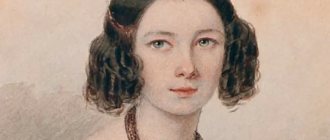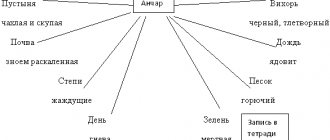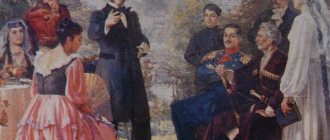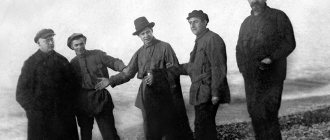4.3
Average rating: 4.3
Total ratings received: 202.
4.3
Average rating: 4.3
Total ratings received: 202.
The poem “I loved you” is so famous that most schoolchildren get acquainted with it long before literature lessons. This is a hymn to a beloved woman and at the same time a reproach to her for not appreciating such strong and reverent feelings. A brief analysis of “I loved you,” according to plan, will reveal to 9th grade students all the facets of this reverent love confession. The analysis can be used to explain the material or as additional information.
The material was prepared jointly with a teacher of the highest category, Kuchmina Nadezhda Vladimirovna.
Experience as a teacher of Russian language and literature - 27 years.
History of creation
Pushkin’s poem “I loved you” was written in 1829 , but it is not known for certain who it was dedicated to.
Some researchers claim that the beautiful stranger is the high-society beauty Karolina Sobanska. It was this woman that the poet raved about for almost ten years, from 1821, when he first met her in Southern exile, and until 1830, when he was already engaged to Natalya Goncharova.
Contemporaries claimed that while awaiting his wedding to his future wife, Alexander Sergeevich literally begged Caroline to remain friends, to maintain pure friendly relations, but received a categorical refusal. His feelings for the beautiful lady never became mutual.
Other researchers believe that Anna Olenina was the subject of inspiration. This is the cousin of Anna Kern, another lover of the ardent poet.
Pushkin tried to woo Olenina, but was refused. Then he wrote short poems in the album of the unapproachable girl.
There are many disputes, but one thing is clear: a beautiful, lyrical work is a tribute to the past, a kind of artistic farewell to carefree youth.
When it was written, the author had already become the official groom of Natalia Goncharova, and both families were preparing for the upcoming wedding.
main idea
Dedicating this poem to his beloved woman, Pushkin knew that it would not upset her much. The work is not tragic, the hero begins a new life, wishing the happiness of his beloved. The meaning of the poem is to demonstrate to the reader true love, one that does not require anything in return, in which there is no place for anger and selfishness.
True love, according to Pushkin, is generous and sacrificial. That is why the lyrical hero sacrifices his feelings for the happiness of his beloved. This is the main idea of the poem “I loved you.”
Image system
In general, there are two images in the poem:
- a man who is unrequitedly in love, who understands the futility of his feeling and lets it go,
- and a mysterious woman.
The first one is written well and brightly. The reader perfectly imagines the suffering and humility of the lyrical hero.
The mysterious woman appears blurry. But from the text one gets the feeling that she is cold, completely indifferent and even, perhaps, arrogant and unapproachable.
The beloved did not share the feelings of the ardent lover, but he is not offended. On the contrary, he sincerely wishes that someone else would experience the same strong, sincere and pure feelings for her as he once experienced himself.
Genre
This is a lyric poem. The view is a classic love lyric, clothed in a perfect form: Pushkin, through the mouth of the lyrical hero, openly declares his feeling, he is not ashamed of it and is not going to hide it. He treats the woman to whom he writes with reverent tenderness, but at the same time does not hide his sadness.
The poem is written in iambic pentameter, its rhythm is complex but clear. The author uses cross rhyme with alternating feminine and masculine rhyme as an ideal form to convey his idea.
Central characters
There are two central characters in the poem in question, as well as images: a man and a woman to whom he is addressing.
One gets the feeling that the lover is already tired of unrequited feelings. Certain changes have taken place in his life - and now, finally, he is ready to part, to let go of his unapproachable lover.
The female character is passive. The author only addresses him, without revealing either his personality or character.
However, it is felt that the woman is still dear to the lyrical hero, and he sincerely does not want to disturb her or disturb her with his unrequited feelings. The man leaves her life, wanting happiness and mutual love.
Themes, mood and issues
- The main theme of the work is unrequited love, which the time has come to let go. Pushkin concentrated all his feelings and poured them out on paper. The work is very tender, sensual, because in it the poet shares the most intimate thing he has - his soul. The poem is written in the genre of a message, but is more reminiscent of a confession, because the hero shares all his feelings with the woman whom he loved madly, and to whom the time has come to say goodbye forever. He makes a promise to himself and to her - not to disturb her anymore. This “letter” is a kind of conclusion, the last news about him and his love.
- At the same time, the motive of sacrificial Christian love for one’s neighbor can also be traced in Pushkin’s lines. At the end of the poem, we see all the warmth and affection of the lyrical hero for this woman, he wishes her true love and happiness, even if not with him, but with someone whom she considers worthy. He generously lets her go and with his suffering paves the way for her to bliss.
- The mood of the poem is sad, the poet suffers and understands that with his love he is making her suffer too. He took a serious step, he is leaving forever, which is why this poem is so imbued with love and sadness, because this is his last message to his beloved.
Composition
The composition of the poem is clearly three-part, and each new part is marked even formally: by repeating the phrase “I loved you.”
In the first, the author admits that, perhaps, love has not yet died out completely, but he will no longer disturb his unapproachable beloved.
Then he talks about previous experiences - there was timidity, jealousy, a range of feelings.
And then he moves on to the third part - the separation itself, the end of a strange relationship. He wishes the woman to be loved just as much by someone else, and in these words, in addition to sincerity, one can also hear a subtle reproach.
Despite the obvious division, the composition cannot be called linear, circular, or mirrored. The whole point is that we have before us pure love lyrics, devoid of a specific plot. There are no clear compositional points (inception, climax and denouement) in it either.
Images and symbols
- The main role in the work is played by the image of the lyrical hero. He does not oblige his chosen one to anything, it hurts him, but he found the strength to understand her and forgive her. His love for her is so great that it does not even require reciprocity; he wants her to be happy even at the cost of his suffering.
- The image of the lyrical heroine is ghostly. All we can say about her is that she is beautiful, willful and quite straightforward. She does not hide her true feelings from the hero, she openly makes it clear that she is not interested in him. It was not without reason that he was tormented by jealousy: his lady loved another.
Means of artistic expression
When creating a love letter, Pushkin used a variety of means of artistic expression.
There are a lot of metaphors here: “love, perhaps, has not yet completely died out in my soul,” “we are tormented by timidity and jealousy.”
In addition, there are inversions: “perhaps,” “in my soul.”
Singing love, the author personifies it: “let it not bother you anymore.”
The poem becomes a wonderful hymn to an unrequited, but sincere and pure feeling.
Analysis of the poem “I loved you” by Pushkin
Option 1
The great poet wrote many love poems dedicated to the women with whom he was in love. The date of creation of the work “I loved you...” is known - 1829. But literary scholars still argue about who it was dedicated to. There are two main versions. According to one, it was the Polish princess K. Sabanskaya. The second version names Countess A.A. Olenina. Pushkin felt a very strong attraction to both women, but neither one nor the other responded to his advances. In 1829, the poet proposed to his future wife, N. Goncharova. The result is a poem dedicated to a past hobby.
The poem is an example of an artistic description of unrequited love. Pushkin talks about her in the past tense. The years could not completely erase the enthusiastic strong feeling from my memory. It still makes itself felt (“love... has not completely died out”). Once upon a time it caused the poet unbearable suffering, giving way to “either timidity or jealousy.” Gradually the fire in my chest died down, leaving only smoldering embers.
It can be assumed that at one time Pushkin’s courtship was quite persistent. At the moment, he seems to be apologizing to his former lover and assuring that now she can be calm. To support his words, he adds that the remnants of the former feeling turned into friendship. The poet sincerely wishes a woman to find her ideal man who will love her just as strongly and tenderly.
The poem is a passionate monologue of the lyrical hero. The poet talks about the most intimate movements of his soul. Repeated repetition of the phrase “I loved you” emphasizes the pain of unfulfilled hopes. The frequent use of the pronoun “I” makes the work very intimate and exposes the author’s personality to the reader.
Pushkin deliberately does not mention any physical or moral virtues of his beloved. Before us is only an ethereal image, inaccessible to the perception of mere mortals. The poet idolizes this woman and does not allow anyone to approach her, even through the lines of the poem.
The work “I loved you...” is one of the strongest in Russian love lyrics. Its main advantage is a concise presentation with incredibly rich semantic content. The verse was greeted with delight by contemporaries and was repeatedly set to music by famous composers.
Option 2
The poem “I loved you...” by Pushkin is a combined text of two quatrains of iambic pentameter with cross rhyme. Its integrity is determined both by the unity of the subject that occupies the lyrical hero and his mood, and by the rising intonation, the rise of tone throughout the entire poem. It is revealed in oral reproduction, but, thanks to the inner ear, it is also obvious to the reader. It is created by the threefold repetition of the confession “I loved you...”, beginning the first, fifth and seventh lines.
In the first case, it begins an emotionally neutral depiction of the psychological state. Left alone with his soul and looking into its innermost corners, the lyrical hero admits that the past has left a deep mark on her, comparable to a smoldering fire:
I loved you: love is still, perhaps,
It hasn’t completely faded away in my soul...
In this image, the development of the poetic metaphor “fire of love” is noticeable, which in Pushkin’s poems is transformed into the motif of a fire illuminating the surrounding darkness (“On the hills of Georgia lies the darkness of the night...”), one memory of which “secretly touches the heart” (“El.N Ushakova", 1825). Here attention is concentrated on the impact that the consciousness has on the heroine that she has lit a flame that burns the soul with unrequited, unrequited love. The lyrical hero is ready to hide it, not wanting to disturb or sadden the one he addresses as “you,” constantly remembering the separation (in eight lines the pronoun forms are repeated six times). The opposite conjunction “but” shows that for him, despite a living feeling, disharmony is unacceptable:
But don't let it bother you anymore;
I don't want to make you sad in any way.
This is the conclusion of the first quatrain; after it, without pause, without skipping, the outpouring continues, where sincerity borders on confessional frankness. It becomes achievable when the tone of speech increases: repetition of recognition entails concretization in the description of the feeling. It was silent, tormenting with jealousy and a feeling of hopelessness:
I loved you silently, hopelessly,
We are tormented by timidity and jealousy...
The unique specificity of the lyrical hero’s feelings is not revealed even in such recognition. The intonation elevation opens a new page containing an unusual comparison: love was so sincere and tender that it could be an example for another. She, like the sun, highlighted all the best in the soul: in the author’s view, these are sincerity, tenderness, selflessness - traits that are significant for the generalized image of a lover. In this regard, the thought arises about the existence of other manifestations of feeling that the beloved may encounter. If the lyrical hero could not become her soul mate, restoring the harmonious whole that should be the connection between lovers, then he is ready to wish her “beloved to be different.” The only important thing is that his soul turns out to be as open to love, devoted and sensitive as his. The third time repeated confession leads to the top:
I loved you so sincerely, so tenderly,
How God grant that your beloved be different.
The lyrical hero’s worldview is dominated by a craving for harmony, the organic nature of which is revealed by the instrumentation (from the Latin “tool”, sound organization) of the poem. In the first quatrain, where love appears strong, burning, but unnecessary, superfluous, capable only of saddening, alarming another’s soul with experience, the sound “and” in a strong, stressed position occurs only once. In the second quatrain, it becomes an assonance, audible, despite the abundance of other repetitions and internal rhymes (silently, hopelessly, timidly, etc.), quite clearly.
Its significance increases due to the fact that the consonance of repeated confessions is built on it (“I loved you...”, we languish, so sincerely). It complements the rich sound palette and attention to it reveals what the chosen one lacks to become happy. She needs to “be loved to be different” so that harmony and agreement are restored in the world. For this reason, the lyrical hero gives up the pursuit of happiness. Thanks to phonic features, the need for harmony appears not as a speculative postulate, not as a logical conclusion, but as a desire growing out of life itself, which the lyrical hero absorbs as organically and sincerely as love. This concludes the analysis of Pushkin’s poem “I loved you: love is still, perhaps...”.
Option 3
In 1829, Pushkin himself designated the time of creation of the poem “I loved you: love is still, perhaps.” In a large academic collection of the poet’s works, this date is specified: “1829, no later than November.” This poem was first published in the almanac “Northern Flowers for 1830”.
When was the poem “I loved you...” written, and to whom was it addressed? Pushkin spent the autumn and winter of 1828 in Moscow and the Tver province, and mid-January–early March 1829 in St. Petersburg. Around March 10, 1829, he left the capital and spent a long time in the Tver province, Moscow and Transcaucasia. At the beginning of November, Pushkin returned to St. Petersburg. It can be assumed that Tolstoy (who then wrote the music for the poems) received the text of the written poem in February - March 1829.
The established date for the creation of Pushkin’s poem “I Loved You” (February - March 1829) strengthens the hypothesis of one of Pushkin’s first biographers, P. V. Annenkov, that the addressee of the poem is A. A. Olenina. This is also consistent with the statement of the granddaughter of A. A. Olenina that until 1917 she kept Olenina’s album with the poem “I loved you...” written in it by Pushkin’s hand.
This poem is written in iambic meter. This size is typical for all of Pushkin’s works.
Cross rhyme (ABAB), with alternating female and male rhymes. The work is divided into two stanzas, each of which begins with an anaphoristic repetition: “I loved you.” This, and the fact that past tense verbs are used in these lines, further enhances the mood of happiness that has irretrievably left the hero.
These three words (“I loved you”) stand out from the rhythmic pattern of the work. After all, the poem is written in iambic, but in this phrase the emphasis falls on the first, second and fourth (spondee). Such semantic stresses enhance the meaning of this line. And, in fact, they are very expressive:
I loved you: love still, perhaps...
I loved you silently, hopelessly...
I loved you so sincerely, so tenderly...
In general, the entire work is written about what is happening at the moment. It is not a memory as such. This is indicated by the present tense verbs in the third and fourth lines (“But don’t let her bother you anymore // I don’t want to sadden you with anything”). Therefore, we can define the genre of a poem as a message or a letter. If we look at the specifics of this genre, we can understand why future tense verbs appear in the last two lines. This is a kind of postscript in which the poet admonishes the addressee:
I loved you so sincerely, so tenderly,
How God grant you, your beloved, to be different.
Each stanza is syntactically a sentence. But the thoughts are separated by a semicolon, not a comma, as usual. This graphic division of lines implies a large semantic pause. This speaks of the excitement of the lyrical hero, of the pain with which these lines are given to him.
This is what concerns the features of the form of the poem. Now let's turn to its contents.
The first quatrain is based on artistic personification. The lyrical hero spiritualizes his love, presenting it as both a part of himself and a separate entity:
I loved you: love is still, perhaps,
My soul has not completely died out;
But don't let it bother you anymore;
I don't want to make you sad in any way.
This is how the poet proves the idea that love is given to a person from above, he is not able to control it. This is an element that captures the entire being. The last two lines sound like a reproach to the lyrical heroine. The poet is sorry that his love only “disturbed.”
The following lines are most likely addressed not to the woman, but to himself. The poet recalls with tenderness his feeling, which is both painful and sweet at the same time. What colorful epithets the author uses!
I loved you silently, hopelessly,
We are tormented by timidity and jealousy...
The last lines of the poem are very indicative of Pushkin's love lyrics. He never curses his feelings for a woman and remains a gentleman to the end, no matter how the relationship ends. This favorably distinguishes Pushkin’s work from Lermontov’s love lyrics:
I loved you so sincerely, so tenderly,
How God grant you, your beloved, to be different.
Pushkin's poem is one of the most remarkable works of Russian literature. It is set to music, and this is one of the highest praises a poet can receive.









